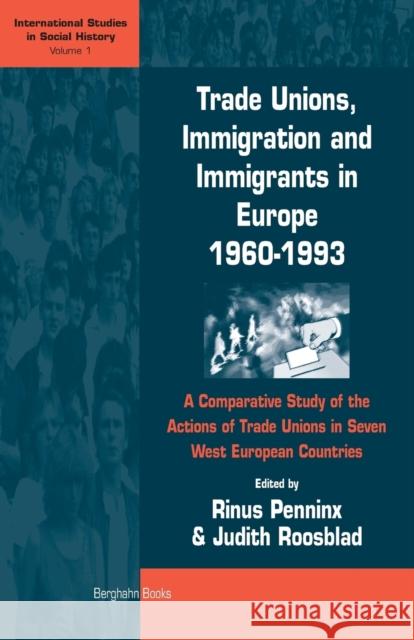Trade Unions, Immigration, and Immigrants in Europe, 1960-1993: A Comparative Study of the Actions of Trade Unions in Seven West European Countries » książka
Trade Unions, Immigration, and Immigrants in Europe, 1960-1993: A Comparative Study of the Actions of Trade Unions in Seven West European Countries
ISBN-13: 9781571817860 / Angielski / Miękka / 2002 / 256 str.
Trade Unions, Immigration, and Immigrants in Europe, 1960-1993: A Comparative Study of the Actions of Trade Unions in Seven West European Countries
ISBN-13: 9781571817860 / Angielski / Miękka / 2002 / 256 str.
(netto: 129,84 VAT: 5%)
Najniższa cena z 30 dni: 134,94
ok. 30 dni roboczych.
Darmowa dostawa!
I would strongly recommend reading this book both as an historical account of past trade union responses to migrant workers and as a base for further investigation into the current situation in Europe. - CLR News In spite of the great complexity of the subject matter this empirical study impresses the reader with its simple and clear structure ... Highly recommended. - Gewerkschaftliche Monatshefte European trade unions are among the most influential and powerful institutions within Western economies, in many cases cooperating with the government and employers' associations in socio-economic decision-making processes. Consequently they also play an important role in the formulation of policies relating to immigration and the migrant workers, who are arriving and becoming part of the workforce the unions are representing and protecting against employers and other authorities. However, trade unions have not always fulfilled their role as the most obvious organization to defend the interests of foreign workers to the extent they could be expected. The reasons for this are complex and due to conflicts of interests that arise from their intermediary position between employers, government authorities, and indigenous workers. This volume offers a rich analysis of the situation in seven major European countries but also a comparison of the data found and an attempt to account for the differences established. It ends with some conclusions on the prospects of trade unions within the European Union, and on the lessons to be learned from the present analysis. Rinus Penninx holds a Chair in Ethnic Studies and is the Director of the Institute for Migration and Ethnic Studies at the Free University of Amsterdam. Judith Roosblad also works at the Institute for Migration and Ethnic Studies and is writing a dissertation on "Trade Unions, Immigration, and Immigrants in the Netherlands," at the Free University of Amsterdam.
I would strongly recommend reading this book both as an historical account of past trade union responses to migrant workers and as a base for further investigation into the current situation in Europe. · CLR NewsIn spite of the great complexity of the subject matter this empirical study impresses the reader with its simple and clear structure ... Highly recommended. · Gewerkschaftliche MonatshefteEuropean trade unions are among the most influential and powerful institutions within Western economies, in many cases cooperating with the government and employers associations in socio-economic decision-making processes. Consequently they also play an important role in the formulation of policies relating to immigration and the migrant workers, who are arriving and becoming part of the workforce the unions are representing and protecting against employers and other authorities. However, trade unions have not always fulfilled their role as the most obvious organization to defend the interests of foreign workers to the extent they could be expected. The reasons for this are complex and due to conflicts of interests that arise from their intermediary position between employers, government authorities, and indigenous workers.This volume offers a rich analysis of the situation in seven major European countries but also a comparison of the data found and an attempt to account for the differences established. It ends with some conclusions on the prospects of trade unions within the European Union, and on the lessons to be learned from the present analysis.Rinus Penninx holds a Chair in Ethnic Studies and is the Director of the Institute for Migration and Ethnic Studies at the Free University of Amsterdam.Judith Roosblad also works at the Institute for Migration and Ethnic Studies and is writing a dissertation on "Trade Unions, Immigration, and Immigrants in the Netherlands," at the Free University of Amsterdam.











